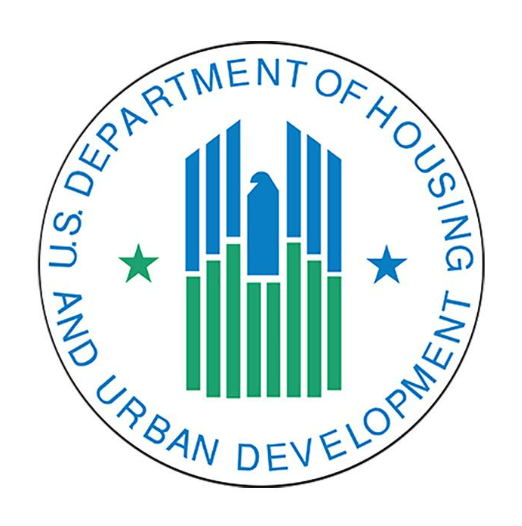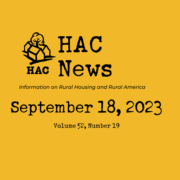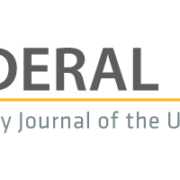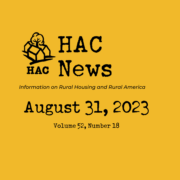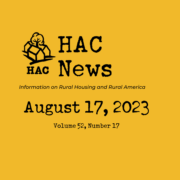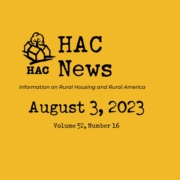Vol. 52, No. 16
TOP STORIES
Congress recesses without agreement on spending
The House and Senate Appropriations Committees have approved versions of most of the 12 appropriations bills needed to fund the government for fiscal year 2024. But their drafts differ, the full House has passed only one bill, the Senate has not passed any of them, and Congress has recessed for the month of August. It is not clear whether it will be possible for legislators to agree on even a continuing resolution to keep the government open after September 30. The Senate plans to reconvene on September 5, the House on September 12. The new fiscal year begins on October 1.
Senate proposes to increase HUD’s funding
On July 20 the Senate Appropriations Committee unanimously approved S. 2437, a bill to fund HUD for fiscal year 2024. Like the House bill, H.R. 4820, the Senate’s version maintains aid for tenants. It holds many other programs at their FY23 funding levels, rejecting the House’s proposed cuts to HOME, Section 202 elderly housing, Section 811 housing for people with disabilities, and the Self-Help Homeownership Opportunity Program (SHOP). It includes no funding, however, for the new Preservation and Reinvestment Initiative for Community Enhancement (PRICE) program for manufactured housing. More details are available on HAC’s site for both the HUD and USDA bills.
USDA close to finalizing eligible areas changes
After a review process that began in March, USDA RD has posted a map showing proposed changes in area eligibility for its housing programs (click on a housing program name and then click on “Proposed Eligibility Areas”). The revised boundaries will be effective October 1. For a complete review of comments received or to ask questions regarding rural area boundaries, contact a USDA RD State Office. The agency’s announcement explains that for areas whose designation will change from rural to non-rural (places that were previously eligible and are becoming ineligible), a one-time notice will be published 30 days prior to implementation date confirming the updated boundaries.
Senate approves Tribal Trust Land Homeownership Act
S. 70, the Tribal Trust Land Homeownership Act of 2023, was unanimously approved by the Senate on July 18. The bill sets specific timelines for the Bureau of Indian Affairs processing of mortgages on Tribal trust land, requiring a decision within 30 days after BIA receives all documentation. The House has not voted on the bill, H.R. 3597, but it was included in a July 12 hearing held by the House Committee on Natural Resources Subcommittee on Indian and Insular Affairs.
RuralSTAT
Revised determinations classify 1,186 (38%) of the 3,144 counties in the United States in the country’s 387 Metropolitan Statistical Areas and 1,958 (62%) outside metro areas. Source: OMB, Revised Delineations of Metropolitan Statistical Areas, Micropolitan Statistical Areas, and Combined Statistical Areas, and Guidance on Uses of the Delineations of These Areas.
OPPORTUNITIES
New program aims to build HUD tenants’ capacity for preservation
The Tenant Education and Outreach program will make grants to nonprofits, for-profits, or HUD-approved housing counseling agencies with experience providing support and technical assistance to low-income tenants or community-based tenant organizations. These intermediaries will make and oversee administration of sub-awards to help local tenant organizations serving project-based Section 8 properties to work with property management, improve management, and advocate for the preservation of affordability. Apply by October 23. For more information, contact HUD staff, TEO@hud.gov.
Pathways to Removing Obstacles to Housing preview available
HUD has posted a preview of the funding notice for its new Pathways to Removing Obstacles to Housing (PRO Housing) program. The final version will be posted on grants.gov in September, with an application deadline of October 30. This competition will use the CDBG statutory and regulatory framework to award $85 million that was included in HUD’s FY23 appropriation for the identification and removal of barriers to affordable housing production and preservation. Local and state governments, metropolitan planning organizations, and multijurisdictional entities are eligible. Public participation is required. HUD will offer several webinars in August. For more information, contact Jessie Handforth Kome, HUD, 202-708-3587 ext. 5539 (phone) or 202-708-0033 (fax), or send questions to CDBG-PROHousing@hud.gov.
Preview for homeownership initiative posted
HUD published a preview of the funding notice for its FY23 Homeownership Initiative. It intends to publish the final notice in FY24 with a 30-day application period. This initiative will make grants to HUD-approved intermediaries, multistate organizations, and state HFAs to provide culturally sensitive, linguistically appropriate housing counseling that results in home purchase, mortgage origination, and preservation of ownership among underserved communities. For more information or to submit questions, email housing.counseling@hud.gov using the email subject line: FY 2023 Homeownership Initiative NOFO, or call Melissa Noe, HUD, 312-913-8648.
CAPITOL HILL
NAHASDA reauthorization passes Senate
The Senate approved a measure to reauthorize and revise the Native American Housing Assistance and Self-Determination Act on July 27, attached as an amendment to the National Defense Authorization Act. NAHASDA, which governs HUD’s housing programs for American Indian, Alaska Native, and Native Hawaiian communities, has not been authorized since 2013. The House passed a different version of the NDAA on July 14, without the NAHASDA amendment. A conference committee will need to resolve the differences between the bills when Congress reconvenes in September.
Senate measure would streamline disaster assistance
The Senate unanimously passed the Disaster Assistance Simplification Act, S. 1528, on July 28. The bill would establish a unified intake system, managed by FEMA, for all federal disaster aid programs.
REGULATIONS AND FEDERAL AGENCIES
Agencies remind landlords to share information with applicants
USDA, HUD, the CFPB, FHFA, and the Federal Trade Commission are distributing information to landlords, operators, and stakeholders on their responsibilities to alert rental applicants about information that is collected in tenant screening reports. USDA says owners of USDA-financed rental properties should post a memorandum in common areas easily visible to all residents and visitors, outlining the legal requirements for property owners and/or landlords.
USDA plans to host a listening session in fall 2023 for rural tenants to discuss ways to advance renter protections.
HUD also announced it intends to issue a proposed rule to affirm a provision of the 2020 Coronavirus Aid, Relief, and Economic Security Act that is already in effect. It will require housing providers to give written notification at least 30 days before evicting tenants in public housing and properties with project-based rental assistance for nonpayment of rent.
USDA launches Tribal pilots for Section 502 guarantee program
Two pilot programs are intended to increase affordable homeownership opportunities for people on Tribal lands – the Tribal Property Valuation Pilot Program, which provides a flexible appraisal option, and the Tribal Rehabilitation Pilot Program, which permits rehabilitation loans for homeowners. Both are effective from July 26, 2023 to July 28, 2025. For more information, contact Laurie Mohr, USDA, 314-679-6917.
Section 184 program area expanded
HUD Dear Lender Letter 2023-06 expands the Section 184 Native American home loan guarantee program into 23 counties in Tennessee and 14 counties in Texas and provides the 2023 maximum loan limits for the newly added counties.
New federal guidance allows Medicaid to cover housing expenses
States have increased flexibility to support housing, and other health-related social needs that impact a person’s health, using Medicaid funding. A Shelterforce article, How States Can Use Medicaid to Address Housing Costs, explains ways states have deployed these funds to cover housing costs and related expenses.
Proposal would address appraisal reconsiderations
The Federal Reserve Board, CFPB, FDIC, National Credit Union Administration, and Office of the Comptroller of the Currency request comments on proposed interagency guidance to address reconsiderations of appraisals. Their notice explains that there is uncertainty about how financial institutions’ requests for re-assessments intersect with appraisal independence requirements and compliance with federal consumer protection laws, including those related to nondiscrimination. Comments are due September 19. For more information, contact Siddarth Rao, OCC, 732-635-2070.
Metro area determinations revised
A July 21 Office of Management and Budget bulletin titled Revised Delineations of Metropolitan Statistical Areas, Micropolitan Statistical Areas, and Combined Statistical Areas, and Guidance on Uses of the Delineations of These Areas provides lists for these types of Core-Based Statistical Areas, applying standards OMB published in 2021. The revisions do not have any immediate impact on housing programs.
USDA posts equity plans
The department has developed equity plans for each of its mission areas, including Rural Development. RD’s plan lists accomplishments including creation of the Rural Partners Network and new actions such as participation in the Property Appraisal and Valuation Equity (PAVE) interagency task force.
HUD issues supplemental RAD notice
Rental Assistance Demonstration Supplemental Notice 4B (Notice H-2023-08/PIH 2023-19, Rev 4B) provides additional flexibilities for PHAs and multifamily housing owners participating in RAD. It also promotes water- and energy-efficiency investments and includes new requirements that address climate resilience and adopt stronger energy efficiency standards. Additionally, the notice provides $12 million to support preservation transactions of eligible housing for the elderly. HUD will offer an overview of the notice in an August 9 webinar.
PUBLICATIONS AND MEDIA
HUD releases national estimates of homelessness for 2021
The 2021 Annual Homeless Assessment Report (AHAR): Part 2 presents the most recent national estimates of homelessness for the year, supplementing Part 1, which reported data gathered on a single night at the national, state, and Continuum of Care levels. Because of the pandemic, data for 2021 were reliable only for sheltered people. The report points out that rural areas have fewer shelter options, so people experiencing homelessness there may be more likely to be unsheltered or doubled-up and therefore would not be included in these figures. The data show that 78% of households experiencing sheltered homelessness were in urban areas, 15% in suburbs, and 7% in rural areas in 2021. The rural share in 2019 was 9%.
GAO recommends better use of SHOP data
A new report from the Government Accountability Office, Affordable Housing: HUD Could Improve Use of Data for the Self-Help Homeownership Opportunity Program, concludes that, while HUD collects some data from SHOP grantees, it has not used that data to inform key program decisions, such as setting the cap on the amount of SHOP funds grantees can spend on each housing unit or evaluating the geographic diversity of units produced. GAO recommends that HUD use project-level and market data to make better-informed program decisions for SHOP. HUD’s response, which is appended to GAO’s report, indicates it will increase its analyses.
Heat has notable impact on colonias and farmworkers
Two recent reports consider the effect of the summer’s extreme heat on vulnerable populations. A July 29 New York Times article titled In Border Towns, a “Dangerous Combination” of Heat and Water Cutoffs describes the difficulties of keeping cool in the Texas colonias, where running water is not reliable. Farmworkers and Heat Stress in the United States, a report released August 2 by the Environmental Defense Fund and La Isla Network, notes that farmworkers are at exceptionally high risk for heat-related illness due to the strenuous nature of their work, which primarily takes place outdoors, and the risk is growing as heat increases because of climate change. The study cites poor housing conditions as a complicating factor.
HAC
HAC is hiring for several positions
- The Senior Housing Specialist – Multifamily is a senior-level role that combines expertise in multifamily housing programs, specifically focusing on USDA 515 and HUD rural housing programs, with the responsibility of providing technical assistance, with a particular focus on transfers of USDA 515 properties. This position plays a leadership role in offering specialized knowledge on USDA 515 transfers and affordable housing preservation, supporting the success of affordable housing initiatives, and ensuring program compliance. This position is eligible for telecommuting.
- The Financial Controller is responsible for day-to-day management of HAC’s finance and accounting processes, applying technical and leadership skills to determine proper application of accounting policies, practices, activities, and recording of transactions in accordance with GAAP and applicable industry standards. The successful candidate will have experience in a complex organization and will demonstrate a strong customer service orientation, balanced communication style, and robust critical and strategic thinking skills. This position is eligible for a hybrid schedule.
- The Senior Human Resources and Payroll Administrator oversees all aspects of human resources and payroll practices and processes. People are HAC’s most important asset and this individual will be an impactful contributor to ensure we have a happy and productive workplace where everyone is inspired to bring their best work, realize their professional growth aspirations, and participate in helping HAC accomplish its mission. This position is eligible for a hybrid schedule.
- The Executive Assistant supports the work of HAC’s Chief Executive Officer, senior leadership, and board of directors. The position is a blend of administrative work and project assignments. Duties and responsibilities include maintaining an effective and well-organized Executive Office, serving as the primary point of contact for the CEO, and managing the meetings, materials, and other needs of HAC’s board of directors. This position is based in Washington, DC.
National Rural Housing Conference registration is open
Register by August 11 for early bird rates at the 2023 National Rural Housing Conference! Stakeholders in the field of rural affordable housing, community development, and placemaking will come together October 24-27 in Washington, DC. The 2023 conference theme is Build Rural – both a literal and figurative appeal to explore and provoke action to build and renew rural communities by addressing housing affordability and preservation, community infrastructure and essential facilities creation and revitalization, resident led placemaking, capacity building, and community inclusion and justice efforts.
Need capital for your affordable housing project?
HAC’s loan fund provides low interest rate loans to support single- and multifamily affordable housing projects for low-income rural residents throughout the U.S. and territories. Capital is available for all types of affordable and mixed-income housing projects, including preservation, new development, farmworker, senior and veteran housing. HAC loan funds can be used for pre-development, site acquisition, site development, construction/rehabilitation and permanent financing. Contact HAC’s loan fund staff at hacloanfund@ruralhome.org, 202-842-8600.
Please note: HAC is not able to offer loans to individuals or families. Borrowers must be nonprofit or for-profit organizations or government entities (including tribes).
Want to reprint a HAC News item?
Please credit the HAC News and provide a link to HAC’s website. Thank you!

